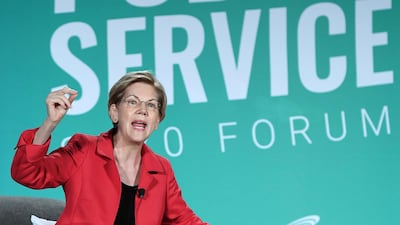The humourist Will Rodgers, born in 1879 in Oologagh, Oklahoma, in small-town America, made a career out of his wry wit and political quips. “The only difference between death and taxes,” he once said, “is that death doesn’t get worse every time Congress meets.”
Or this: “Good judgment comes from experience, and a lot of that comes from bad judgment.” Well, on American television this long, hot summer, fans of Rodgers (including myself) have had plenty of opportunity to reflect on his political wisdom while watching Democratic hopefuls jostle for airtime in TV debates. They are struggling to find a candidate to take on US President Donald Trump in the 2020 election.
Can "good judgment" in 2020 follow recent experiences based on "bad judgment", when, under normal circumstances, the Democrats' battle should, in theory, be hopeless? The US economy – at least superficially – appears to be doing well. In the past that has meant an incumbent president can see off most challengers. But these are not normal times and Trump is not anyone's idea of a normal president. More importantly, the big picture statistics on the US economy are not what they seem. They do not reflect the difficult lives of millions of Americans who are not doing well.
The Nobel prize-winning US economist Joseph Stiglitz has been on a recent book tour in Britain promoting his latest work People, Power and Profits. Stiglitz is a rare beast, a world-class economist who can communicate with ordinary people in a language those of us without a university degree in economics can understand. Essentially his book bursts the myth that the US economy is doing well, if by "doing well" you mean making life better for most Americans.
Stiglitz argues that – in a memorable phrase from former president George HW Bush – "voodoo economics" of low taxes and low investment in public services has made America's ultra-rich very much richer while other Americans are clinging onto a shattered dream. He calls Trump's economic plans "a self-serving superstition" based on a "disdain for truth, for science, for knowledge", producing great inequalities in wealth and income and also low growth and lack of innovation in what is supposed to be an innovative country. Almost half of American families do not have enough surplus cash to pay an unforeseen bill of as little as $400, whereas the three richest Americans – Jeff Bezos, Warren Buffett and Bill Gates – together are worth more than the poorest half of the US population.
Modern economics, he says, show that countries which are vastly unequal perform more poorly than others and that things were better for the average American during the Cold War. Then, competition with Soviet communism meant US presidents had to try to improve the lives of ordinary workers. Nowadays that sense of social cohesion has disappeared. There is a new “greed is good” style of economic exploitation which, Stiglitz argues, is not real wealth creation and indeed stifles it.
The Stiglitz analysis should be required reading for all the many Democratic Party candidates seeking to take on Mr Trump in November 2020. Even if they reject his solutions, Stiglitz is able to point to the American economy stats being as fake as the gold elevators of Trump Tower.
The big question, however, is that even if the Democrats come up with a policy of economic reform, can they find a suitable messenger? They have more than 20 candidates to choose from, although most are expected to drop off in the next few weeks. Of the big names, Bernie Sanders offered a version of the Stiglitz message in 2016 and failed. Joe Biden, the former vice president, might be too tied to what Bill Clinton once called "the brain-dead politics of the past" to break through now. Two outstanding women – Kamala Harris and Elizabeth Warren – might be the ones to watch.
I have been impressed by Ms Warren for years. She has spoken plainly of the US economy as being “rigged” against ordinary people and in blunt terms, has attacked those business leaders who demand low taxes and small government while suggesting that public services are parasites on business culture.
Ms Warren points out that businesses do not succeed on their own. They require publicly financed systems – roads, airports, the rule of law, police, defence, schools, universities and so on – to be successful. That means taxes – an argument that has always been difficult to sell in an America where the idea of paying for public services is considered loathsome.
Moreover, even if Ms Warren and others make these arguments, will voters listen? In 2016, they preferred the slogans and made-for-TV antics of Mr Trump. Stiglitz notes that among middle-aged white American men without a college education, mortality rates increased markedly in the years beforehand. Even so, men in this demographic overwhelmingly voted for Mr Trump. In 2016 they were keen to "make America great again". What will they do in 2020?
Gavin Esler is a journalist, author and presenter


